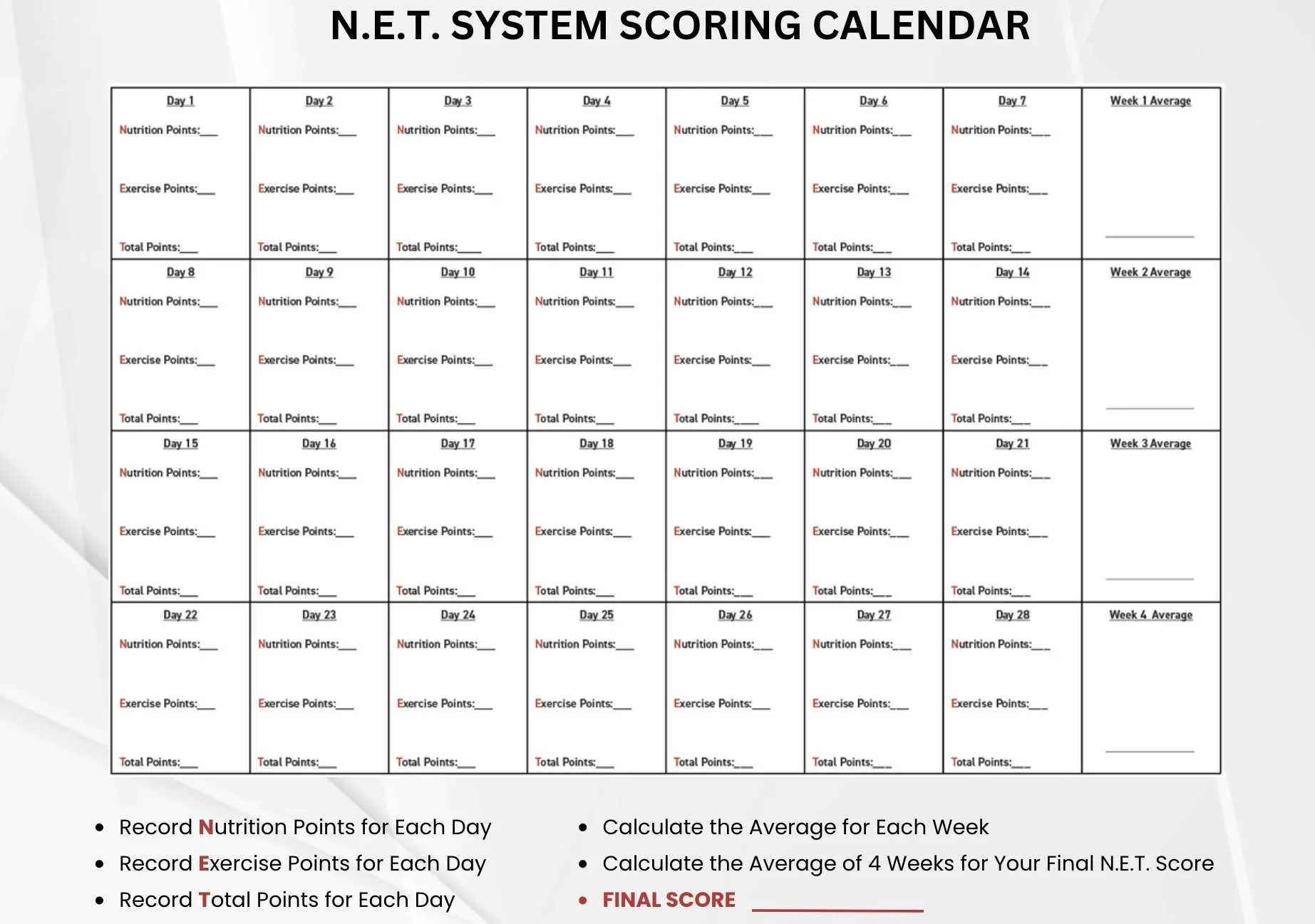The N.E.T. Advantage - A Simple Approach to the 80/20 Rule for Firefighter Fitness
By Ryan Provencher
The Firefighter Peak Performance N.E.T. System is a simple yet powerful framework built around four key components: Nutrition, Exercise, Tracking, and Commitment. By scoring daily habits and tracking progress over time, firefighters can build consistency, stay accountable, and optimize their health and performance.
As firefighters, we thrive on structure, simplicity, and accountability. Our daily routines revolve around clear plans and procedures that help us manage the unpredictable nature of the job. The same principles apply to fitness and nutrition—having a practical and actionable approach can make all the difference in improving health and performance.
Enter the Firefighter Peak Performance N.E.T. System—a simple yet effective framework designed to bring order to the chaos we often experience in our lives. Built on the 80/20 Rule, it maximizes results without adding unnecessary stress. Long shifts, sleep deprivation, and the physical demands of emergency response mean time and energy are often limited. The N.E.T. System helps you focus on the essentials, ensuring progress without the pressure of perfection.
The Origin Story - How It All Began
In 2011, the Firefighter Peak Performance N.E.T. System was developed through an informal study on Firefighter Tactical Fitness, designed to test the impact of structured Varied Intensity Interval Training and Performance Nutrition strategies on occupational readiness. Over 108 days, participants followed a progressive fitness program paired with practical nutrition guidance, ensuring their training aligned with the demands of firefighting and shift work
The study paired daily workouts with healthy nutrition, focusing on consistency, mindfulness, and habit-building to fit the unpredictable nature of the fire service. The results spoke for themselves: participants who stayed committed saw measurable improvements in strength, endurance, and body composition—critical factors for peak performance on the fire ground.
Study Overview:
60 Expressed Interest
40 Participated Sporadically
20 Maintained 60% Compliance
11 Maintained 70%+ Compliance
Average Age: 41
Males: 9, Females: 2
Key Outcomes:
Weight Loss: Up to 11 lbs (Avg: 1.4 lbs)
Fat Loss: Up to 9 lbs (Avg: 2.3 lbs)
Body Fat % Reduction: Up to 4.3% (Avg: 1%)
Lean Body Mass Gain: Up to 5 lbs (Avg: 1 lb)
Abdominal Circumference Reduction: Up to 2.25 inches (Avg: 1.2 inches)
Push-Up Increase: Up to 20 reps (Avg: 4 reps)
Pull-Up Increase: Up to 9 reps (Avg: 4 reps)
VO₂ Max Improvement: Up to 4.9 ml/kg/min (Avg: 1.73 ml/kg/min)
The Takeaway? Quality programming matters, but consistency is the real key to success. Firefighter fitness isn’t about perfection—it’s about persistence. This study demonstrated that a simple, structured approach to training and nutrition can lead to real, measurable improvements, despite the challenges we face on and off the job.
While not everyone completed the full 108 days, the study sparked meaningful conversations about fitness, nutrition, and recovery throughout the department. This event sparked a cultural shift toward a more intentional approach to fitness and nutrition, influencing how many firefighters prioritize their health today.
Why the 80/20 Rule?
The 80/20 Rule helps simplify mindful and intentional decision-making with an emphasis on progress and not perfection. When applied to fitness and nutrition, it means that focusing on a few key habits can drive most of your results. For firefighters with unpredictable schedules, the 80/20 Rule allows flexibility to stay on track while accommodating the dynamic nature of our job.
Why the 80/20 Rule Works:
Sustainability: Prioritizing essential habits creates a realistic, long-term approach to health.
Flexibility: The 80/20 Rule allows quick recovery from setbacks, like missed workouts or indulging in a treat.
Reduced Stress: Let go of guilt and focus on progress, not perfection.
Improved Performance: High-impact habits translate to better energy, strength, and endurance on and off the job.
By embracing the 80/20 Rule, this system offers a practical, sustainable framework for improving fitness and nutrition, even amidst the chaos of firefighter life.
The Four Components of the N.E.T. System
The N.E.T. System is broken into four key components: Nutrition, Exercise, Tracking, and Commitment. You will record a N.E.T. Score for each day and the average of your daily scores each week. Here’s how it works:
1. Nutrition
Tracking your nutrition is essential for building sustainable habits that support performance, recovery, and overall health. This system is designed to be simple, flexible, and focused on consistency rather than perfection.
How Nutrition Scoring Works:
Each day starts with 6 Nutrition Points, representing an ideal day of balanced, high-quality nutrition. Your goal is to maintain as many of these points as possible by making mindful food and beverage choices throughout the day.
Point Deductions: Deduct one point for each instance of deviation from your nutrition plan. Common reasons for deductions include:
Processed or fast foods (e.g., fried foods, packaged snacks)
Lack of protein (e.g., skipping protein at meals)
Insufficient fruits and vegetables
Excess sugar intake (e.g., sweets, sugary drinks)
Alcohol consumption
Inadequate hydration
At the end of the day, your Nutrition Score reflects how well you adhered to your plan.
Flexibility & Real-Life Application:
This system isn’t about restriction; it’s about awareness and making sustainable choices. You have flexibility in how you structure your approach:
Daily Moderation: You can enjoy one treat or beverage per day without significantly impacting your score, as long as the rest of your meals align with your plan.
Planned Off-Day: Follow a clean eating plan all week and designate one “off day” to enjoy a special occasion or indulgence without feeling guilty.
This flexibility prevents the "all-or-nothing" mindset that often leads to frustration or unsustainable dieting.
The Goal: Awareness & Mindful Choices
Rather than aiming for perfection, focus on consistency and awareness. Tracking your nutrition daily will help you recognize patterns and make better choices over time. Small, mindful improvements lead to long-term success, supporting performance and overall well-being.
2. Exercise
Tracking your exercise performance is crucial for consistency and long-term progress. This system keeps you accountable while allowing flexibility based on your energy levels, recovery, and readiness.
Tracking Your Exercise:
Each day starts with 4 Exercise Points, representing full participation in the training program. Your goal is to maintain these points by completing your daily workout as prescribed.
4 Points: Completed workout as prescribed
Deduct 2 Points: Incomplete or partial workout
Deduct 4 Points: Skipped workout
If you're feeling fatigued or stressed, substitute a lower-intensity workout or active recovery session for full points. The goal is consistency, not intensity.
Why This Approach Works:
This scoring method focuses on consistency, not perfection. Life happens, and some days you may feel fatigued, stressed, or not fully recovered. Instead of forcing high-intensity workouts when your body needs rest, this system encourages adaptation and self-awareness.
The Goal: Long-Term Consistency
Consistency is key to sustainable exercise habits. Intensity may fluctuate, but showing up and moving every day is essential. Tracking your exercise scores will help you identify trends, adjust your approach, and stay engaged in your fitness journey.
3. Tracking
Tracking your N.E.T. Score is an essential part of measuring participation in your plan. By logging your daily scores for Nutrition and Exercise, you gain insight into your habits and stay accountable.
How to Track Progress:
Record your Nutrition Points each day.
Record your Exercise Points each day.
Add your Nutrition and Exercise scores for the Total Daily Score.
Calculate your Weekly Average.
Calculate the Final N.E.T. Score in your program as the average of your Weekly Scores.
A final N.E.T. Score of 8 or higher signifies strong adherence to the program and sets you up for long-term success.
N.E.T. System 4-Week Scoring Calendar
Download and Print Your N.E.T. System 4-Week Scoring Calendar
4. Commitment
Commitment is the key to consistency. Focus on fueling your body with quality nutrition and maintaining deliberate, focused training. This builds resilience, reduces injury risk, and sets you up for long-term success.
The Benefits of the N.E.T. System:
Better Results Without Burnout: Focus on the essentials and avoid overwhelm.
Sustainable Habits: Small, consistent changes lead to lasting results.
Improved Awareness: Tracking helps you make smarter choices.
Flexibility: The N.E.T. System allows balance and enjoyment.
Gamify Your Progress
Turn the N.E.T. System into a fun challenge:
Solo Goals: Set personal challenges like maintaining a score of 9 for a month.
Friendly Firehouse Competition: See who can maintain the highest average score for the week.
Reward Milestones: Celebrate achievements—like hitting a month-long goal—with a special treat.
The N.E.T. System isn’t just another fitness challenge—it’s a sustainable, no-nonsense game plan designed for the demands of the fire service. This simple framework helps you stay focused, consistent, and in control, even when life gets chaotic. Whether you’re at the firehouse, at home, or on the go, it’s about making smart choices, adapting when needed, and staying committed to daily progress. Trust the process, stay the course, and keep pushing toward your firefighter fitness and performance goals.


